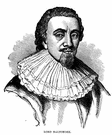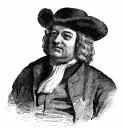The Making of the 50 States: Maryland
Part 1: In the Beginning Maryland was the seventh state to ratify the Constitution. As with other of the 13 Colonies, the land was originally inhabited by Native Americans. The main tribes living in the area were the Algonquin tribes, specifically the Accohannock, Nanticoke, Piscatawy, Shawnee, Susquehannock, and Yaocomaco. The first European explorers in the area included the Englishman John Cabot, who sailed along the coast in 1498, and Giovanni da Verrazano, an Italian explorer better known for lending his name to the famous New York City bridge, who moved through in the 16th Century. The first English explorers arrived in 1608, one year after the founding of the Jamestown Colony. As early as 1631, fur trader William Claiborne was operating a fur trading post on Kent Island, in the Chesapeake Bay area.
In 1633, the British ships the Ark and the Dove set sail from the Isle of Wight, with settlers onboard. They landed the following year and founded St. Mary's City. That same year was the first meeting of the General Assembly, the colony's first representative lawmaking body. One of the highlights of the early days of Maryland was the influential "Act Concerning Religion," which guaranteed people in Maryland the freedom to practice whatever religion they wanted. Religious persecution—punishing people because they didn't believe in God the same way you did—was one of the main reasons that people left Great Britain. (An excellent example of this is the Pilgrims.) In the same year that this Act appeared, 1649, Puritans founded Providence, which is the modern-day Annapolis, capital city of Maryland. Like other states in this time, Maryland had slavery. A law in 1664 made it legal and decreed that slaves served their masters for their entire lives. Maryland's religious toleration law attracted members of many different faiths, including the Quakers, followers of William Penn, the founder of Next page > The Rest of the Story > Page 1, 2 |
|
Social Studies for Kids
copyright 2002–2024
David White



 Maryland's first step toward modernization came in, when George Calvert, the first Lord Baltimore, gained permission from Britain's King
Maryland's first step toward modernization came in, when George Calvert, the first Lord Baltimore, gained permission from Britain's King  Pennsylvania. Others felt free to worship in Maryland as well, including Presbyterians, Puritans, and Episcopalians (Church of England). As was often the case in the 17th Century, however, the people doing the governing of the American colonies got their orders from the British monarch, which often changed. This was the case in 1688, in what is called in Great Britain the Glorious Revolution. The new king and queen were William and Mary, and they made it a priority to make Maryland a royal colony, which for Maryland meant much less autonomy (self-rule). For starters, the Church of England was made the official religion of the colony. Catholicism, especially, would come under heavy scrutiny from the colonial government for many years afterward.
Pennsylvania. Others felt free to worship in Maryland as well, including Presbyterians, Puritans, and Episcopalians (Church of England). As was often the case in the 17th Century, however, the people doing the governing of the American colonies got their orders from the British monarch, which often changed. This was the case in 1688, in what is called in Great Britain the Glorious Revolution. The new king and queen were William and Mary, and they made it a priority to make Maryland a royal colony, which for Maryland meant much less autonomy (self-rule). For starters, the Church of England was made the official religion of the colony. Catholicism, especially, would come under heavy scrutiny from the colonial government for many years afterward.
